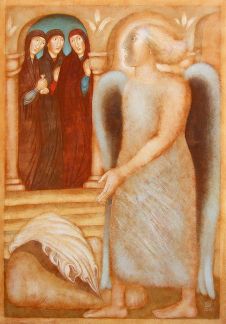Triduum Sacrum: Pascha I
2018 – Cycle B
Acts 10: 34a, 37-43; Psalm 118; 1 Corinthians 5:6b-8; Mark 16:1-7
Life does not occur in a vacuum. We live in a given time and place.
This was true for Mary Magdalene, Mary, the mother of James, and Salome. They lived under an oppressive, foreign, violent imperial empire in which life was cheap: slavery, death as entertainment, infanticide, women and children treated as property by a male population and crucifixion as government sponsored terror. This was the world of these  women.
women.
Into this world came Jesus of Nazareth. They had listened to him and became his disciples, but now what? What was it like for these women to stand at a distance and helplessly watch Jesus’ horrific public torture and execution? And having witnessed that mockery of human life to now arrive at the grave and find the tomb empty?
Can we understand why they ran from the tomb as if running from the terror of Calvary…as any of us would run or turn our faces from that which is repugnant and frightening? Have you ever watched the YouTube videos of the decapitations and crucifixions of ISIS? I expect not.
Can we understand why they were afraid? …why they said nothing to anyone?
What might happen to them if a connection is made between them and the criminal Jesus of Nazareth? We saw how Peter distanced himself from Jesus when connections were being made due to his accent and his place of origin in Galilee. Is that why the women stood at a distance? They too were from Galilee. Was there the fear of having placed their trust in what was not real? Were they deceived by Jesus? What about his promises of life?
If we listen intently to the resurrection stories they are all tinged with the cross. Death and resurrection are not separate events but are bound together like subatomic particles in the nuclear dance at the center of every atom, at the center of life.
Like Mary Magdalene, Mary and Salome, our lives do not occur in a vacuum.
We live in a given time and place.
A time, much like that of the myrrh – bearing women, in which empires of corporate culture control our lives and greed and unethical practices abound, where life is cheap as seen in slavery, pornography, human trafficking, abortion, violence as entertainment, euthanasia, sexual harassment and abuse, and the common place occurrence of terrorist acts against innocent people.



Our time is marked by an awareness that our planet is fragile; that natural resources are limited, that deforestation and pollution on one part of the planet have global effects for all life.
Our time is marked by a great movement of change in social structures which is causing some people to retreat into the past and others to move too fast(?) into the future…or is it all a running away?



Our time is marked by great advances in science, medicine and our understanding of the depths of our own existence in the genome to the outreaches of galaxies, stars and planets light years beyond us.
Our time is marked by the greatest movement of people across the globe as refugees from war, violence and, as our grandparents did, looking for a better way of life causing fear and intolerance among the nations.
Our time is marked by a restlessness in religion where ancient traditions are questioned or abandoned. The search for the sacred is a wandering path of religious consumerism.
We live in a given time and place. It is into this time and place that Jesus is present as crucified and risen Lord. This Easter morning is not about the past but about our present age in Christ Jesus and how we respond to cross, death and life. The women ran away in fear. Peter and the apostles fled and distanced themselves from Jesus. What about us?
 Remember that risen from the dead Christ eternally bears the marks of nails and lance. And conversely, the cross is where we are both confronted by death and see in the death of Jesus how empty its power is over us.
Remember that risen from the dead Christ eternally bears the marks of nails and lance. And conversely, the cross is where we are both confronted by death and see in the death of Jesus how empty its power is over us.
Might it be that we will find hope and new life in our time and place in the woundedness of our world, in struggling with the deep ethical questions of our times and in confronting head on the many faces of death that seek to devour our world today.
How will we, as Christians in the 21st century,
respond to an empty tomb?
